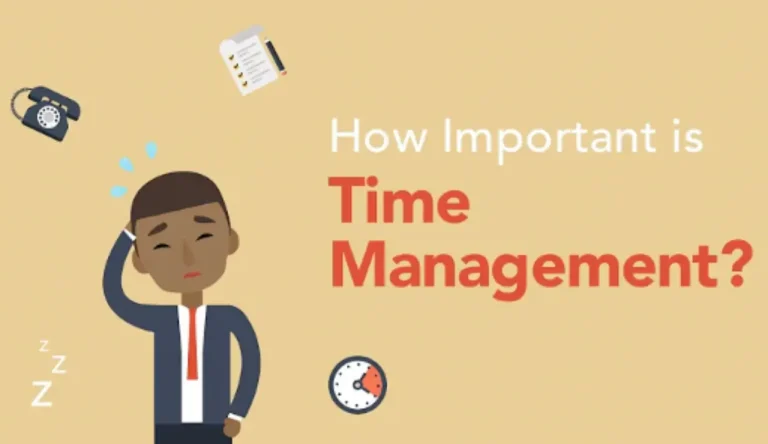How Does Procrastination Affect Your Time Management
Do you ever feel like time is slipping through your fingers? Like you’re constantly running out of hours in the day to accomplish everything on your to-do list? Well, if you struggle with procrastination, it’s no wonder that your time management skills may be suffering.
Procrastination, the art of putting off tasks until the last possible moment, can have a profound impact on how effectively you manage your time. In this article, we will delve into the psychology behind procrastination and explore just How Does Procrastination Affect Your Time Management .
We’ll also discuss the detrimental effects it has on goal achievement and offer practical strategies for overcoming this habit. By building self-discipline, creating a productive environment, and seeking support from others, you can reclaim control over your time and finally break free from the clutches of procrastination.
Key Takeaways
- Procrastination hinders time management skills and leads to wasted time and missed opportunities.
- The psychology behind procrastination involves fear of failure, perfectionism, lack of motivation, and feeling overwhelmed.
- Consequences of procrastination include missed deadlines, increased stress levels, and reduced productivity.
- Strategies for overcoming procrastination include time blocking, prioritizing tasks, breaking tasks into smaller steps, and building self-discipline and motivation.
Understanding the Psychology of Procrastination
Do you ever feel trapped by the overwhelming urge to put things off, losing precious time and productivity due to the psychological grip of procrastination? Understanding the psychology behind procrastination can shed light on why we engage in this self-defeating behavior.
Procrastination triggers can vary from person to person, but common factors include fear of failure, perfectionism, lack of motivation, or feeling overwhelmed.
The consequences of procrastination are far-reaching and can negatively impact your time management. By delaying tasks, you may find yourself scrambling at the last minute to complete them, leading to increased stress levels and decreased quality of work.
Additionally, procrastination can create a cycle where unfinished tasks accumulate, further contributing to feelings of overwhelm.
Recognizing these triggers and understanding the consequences is crucial in developing effective strategies for managing procrastination and improving your overall time management skills.
Time Wasted and Opportunities Lost
While procrastination dances away, precious moments slip through your fingers like sand in an hourglass. Time wasted and opportunities lost are the unfortunate consequences of succumbing to this habit.
Here are three ways in which procrastination negatively impacts your time management:
- Missed Deadlines: By putting off tasks until the last minute, you risk missing important deadlines and compromising the quality of your work.
- Increased Stress Levels: Procrastination leads to a buildup of unfinished tasks, causing stress and anxiety as you scramble to complete them all at once.
- Reduced Productivity: When you delay taking action, you waste valuable time that could have been spent on more productive activities, hindering your overall efficiency.
By understanding these time management challenges caused by procrastination, you can take steps to overcome it and regain control over your schedule.
Procrastination’s Effects on Goal Achievement

Achieving your goals becomes increasingly challenging when you let procrastination take hold, as it hinders progress and diminishes motivation. Procrastination has significant effects on productivity, causing delays and missed deadlines. When you continuously put off important tasks, you end up with less time to complete them, resulting in rushed and subpar work. This not only lowers your overall productivity but also decreases the quality of your output.
Additionally, procrastination can have a negative impact on your mental health. The stress and anxiety that comes from constantly feeling overwhelmed by unfinished tasks can lead to decreased focus, increased fatigue, and even feelings of guilt or shame. These mental health consequences further hinder your ability to effectively manage your time and achieve your goals.
It’s important to recognize the detrimental effects of procrastination and develop strategies to overcome it for improved time management and goal attainment.
Overcoming Procrastination: Strategies and Techniques
To overcome procrastination, it’s crucial to adopt effective strategies and techniques that enhance productivity and goal attainment. Here are three key strategies that can help you overcome procrastination:
- Time blocking: Allocate specific blocks of time for each task or activity on your schedule. By setting aside dedicated time slots, you create a structured approach to completing tasks, which helps prevent procrastination.
- Prioritizing tasks: Determine the importance and urgency of each task and prioritize them accordingly. Focus on completing high-priority tasks first before moving on to lower-priority ones. This way, you ensure that important tasks aren’t delayed due to procrastination.
- Breaking tasks into smaller steps: Large tasks can feel overwhelming and lead to procrastination. Break them down into smaller, more manageable steps. This makes the task seem less daunting and allows for incremental progress towards completion.
By implementing these strategies, you can effectively combat procrastination, improve time management skills, and increase productivity in achieving your goals.
Building Self-Discipline and Motivation
To build self-discipline and motivation, you need to cultivate a growth mindset and develop a strong sense of determination. This means believing that your abilities can be improved through effort and perseverance.
Additionally, utilizing motivation techniques such as visualization and positive reinforcement can help you stay focused on your goals and maintain a positive attitude towards achieving them.
By actively practicing these strategies, you can enhance your self-discipline and boost your motivation levels, ultimately leading to greater success in managing your time effectively.
Cultivating self-discipline and developing a growth mindset
Developing a growth mindset and cultivating self-discipline will allow you to break free from the stronghold of procrastination, empowering you to effectively manage your time and achieve your goals. By developing habits that promote productivity and maintaining focus on your tasks, you can overcome the tendency to delay important responsibilities.
A growth mindset involves believing in your ability to improve and embracing challenges as opportunities for growth. With this mindset, setbacks are seen as learning experiences rather than failures. Cultivating self-discipline involves setting clear goals, creating a schedule, and sticking to it even when faced with distractions or temptations.
To help visualize the importance of these practices, consider a 3 column and 4 row table:
| Habit | Benefit |
|---|---|
| Setting specific goals | Provides clarity and direction |
| Creating a routine | Establishes structure and reduces decision fatigue |
| Prioritizing tasks | Focuses attention on important responsibilities |
| Avoiding multitasking | Enhances concentration and efficiency |
By implementing these strategies into your daily life, you can develop the discipline needed to manage your time effectively, minimize procrastination, and ultimately achieve success in reaching your goals.
Utilizing motivation techniques, such as visualization and positive reinforcement
Now that you understand the importance of cultivating self-discipline and developing a growth mindset, let’s explore how you can utilize motivation techniques to combat procrastination and improve your time management.
One effective technique is visualization. By mentally picturing yourself completing tasks successfully and imagining the positive outcomes that’ll result from your efforts, you can boost your motivation and focus. Visualization helps create a clear image of what needs to be done and provides the drive needed to take action.
Additionally, implementing a rewards system can further enhance your motivation. Set specific goals for yourself and establish rewards that you’ll receive upon completion of those goals. These rewards can range from simple treats like enjoying a favorite snack or taking a break to more significant incentives such as treating yourself to something special or planning an outing with friends.
Creating a Productive Environment
Surround yourself with an organized and clutter-free workspace, like a serene oasis amidst the chaos of procrastination, to enhance your productivity. A productive environment plays a crucial role in creating a productive mindset and eliminating distractions. To achieve this, consider the following elements:
| Element | Description |
|---|---|
| Lighting | Ensure sufficient natural or artificial light to reduce eye strain and promote alertness. |
| Ergonomics | Use ergonomic furniture and equipment to maintain good posture and prevent physical discomfort. |
| Organization | Keep everything in its place, use folders or digital tools for easy access to documents and files. |
By implementing these elements, you create an atmosphere that fosters focus and efficiency. An organized workspace allows you to easily locate materials needed for tasks without wasting time searching for them. Additionally, it helps minimize distractions by reducing visual clutter that can divert your attention away from important work. Remember, a well-designed environment sets the stage for better time management and increased productivity.
Seeking Support and Accountability

Improve your productivity by seeking support and accountability from others who can help you stay on track and motivated. Building a network of support groups or finding an accountability partner can greatly enhance your time management skills. Here are three ways in which these strategies can benefit you:
- Shared Goals: Joining a support group or having an accountability partner allows you to share your goals and aspirations with like-minded individuals who understand the challenges of procrastination. They can provide valuable insights, suggestions, and encouragement to help you overcome obstacles.
- Regular Check-Ins: Accountability partners offer regular check-ins to keep you accountable for your actions. Knowing that someone is monitoring your progress can increase your motivation to complete tasks in a timely manner.
- Feedback and Guidance: Support groups and accountability partners provide feedback on your progress, offering constructive criticism when necessary. They also offer guidance on how to improve time management skills based on their own experiences.
By seeking support and accountability, you can foster a more productive environment for yourself and effectively manage your time.
Frequently Asked Questions
Conclusion
In conclusion, procrastination can have a significant impact on your time management. With opportunities lost and goals left unaccomplished, it’s essential to understand the psychology behind this habit.
However, don’t despair! By implementing strategies and techniques like building self-discipline, creating a productive environment, and seeking support, you can overcome procrastination and improve your time management skills.
So, why wait any longer? Start taking control of your time today and see the positive changes it brings to your life.






